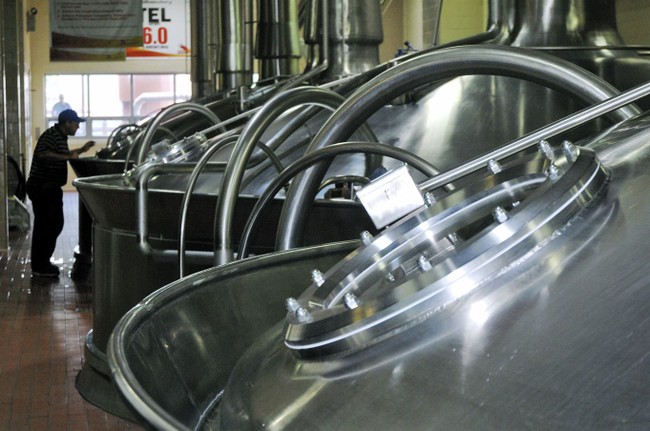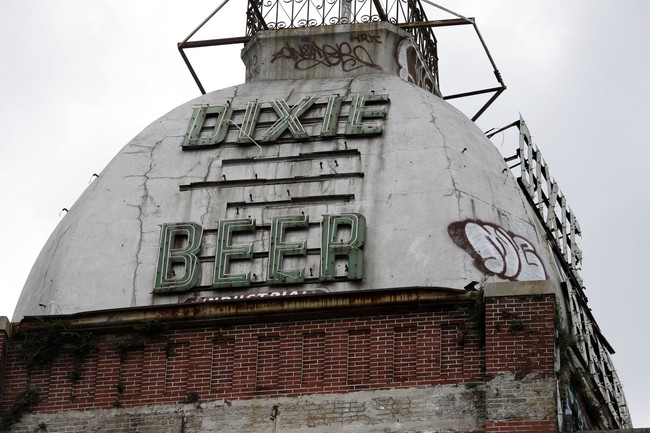In the next couple of weeks, a fire sale will be taking place. It is a not-uncommon event, especially in the current economy; a failed business venture selling off its assets, hoping to recoup some of the losses before shuttering completely, is becoming all too common. That this involves a brewery that was recently relaunched and the dissolution of a longtime established brand is only part of the story
Faubourg Brewery in East New Orleans is set to sell off its brewing vats, bottling line, and numerous other components at pennies on the dollar, a sad end to a costly venture meant to rejuvenate both local brewing and the city. Its failure stems from a series of unforced errors; toplining that list was the decision to forego a well-established label for the sake of virtue-signaling sensibilities.

From Woke Beer to Broke Brewery
Dixie beer was a long-established brew in the New Orleans-Gulf Coast region. While not a particularly quality brew, it fit the bill of a regional label, one well-known enough to those outside the region. Originating around the turn of the 20th century Dixie was an established brand for decades, but then upheaval began some 40 years or so ago. Ownership sold out to Coy International in 1983, and then quickly, after two years, it was sold again, to the husband and wife team of Joseph and Kendra Bruno.
The couple endured tough times, but they did endure. There was a bankruptcy from which they emerged, and then Hurricane Katrina flooded out the complex, after which it fell prey to looting. The damage was enough that Dixie had to be brewed on a contract basis, first out of Joseph Huber Brewing in Wisconsin. Dreams of returning the brewing of the beer to New Orleans looked remote, but then a local success story stepped in.
Tom Benson was the owner of the New Orleans Saints and the Pelicans NBA team, and in 2017, he bought a controlling interest in Dixie with the plan to bring the production back to the city. This concept became delayed, however, with the passing of Benson less than one year later, but his dream did not die with him. His wife Gayle took over his operations, including the beer company, and she kept the goal of the return of Dixie alive.
In 2019, the brewing of Dixie was shifted to Blues City Brewing in Memphis, while Gayle Benson embarked on building a brand new brewery in East New Orleans. This would become a $30 million facility, and in November of that year, Dixie was once again produced locally. Other Dixie-created labels were made on site, the Voodoo and Jazz lines of beers which came about in the 1990s when tapping into the craft beer movement. Then, the foaming enterprise turned flat.

Untapping Bad Decisions
As Dixie Brewing was firing back up, it was beset by unforeseen influences. First, the pandemic arrived, which saw the shutdown of its taprooms and other on-site operations apart from the canning and bottling. Then, in that summer of 2020, the George Floyd riots erupted, and with them, the sweeping desire of woke messaging in corporate America developed, something that Gayle Benson could not resist.
This was the era when companies, brands, and even musical acts were getting into the practice of changing out names and logos deemed to be racist through archaic connotations to history. Aunt Jemima, for example, was one brand that went through a reconfiguration, leading to disastrous market results. Country trio The Dixie Chicks followed suit, truncating their name by dropping the allegedly hateful “Dixie”, and thus Gayle announced her signature beer, and the brewery, would likewise lose the historic appellation.
This was both foolish and foolhardy. Dixie was little more than a geographic term. Most associate it with the Mason-Dixon Line, but in truth, there is a more valid and historical root with the city. Once, the state produced its own currency through the Citizens Bank of Louisiana. Its $10 notes on the back bore the word “DIX,” the French word for the number ten, and soon the area was known as “Dixieland.”
Suggesting this is in any way a racial designation is rather made in error, but this leads into a series of error-prone decisions by the brewery. Swept up in the virtue signaling of that year, Gayle Benson announced they were changing the name, and after months of suggestions and research, settled on a distinctly local name, rechristening her venture Faubourg Brewing. The name is a local term used to designate neighborhoods; it did little, however, to appeal to drinkers.
Much like the misbegotten syrup decision, the dismal fortunes of the former Aunt Jemima were reflected in the former Dixie beer, and soon, Benson was entertaining business offers from outside. In September of 2022, she was taken in by a beer entity called Made By The Water, a division of Wiregrass Equity Partners, a venture capital firm. That they began to operate like equity firms where assets are quickly dispatched and companies quickly dissolve was of little surprise.
Made By The Water is operated by Alexi Sekmakas, the son of the Wiresgrass CEO. He controls several other small breweries, but his track record is considered checkered at best. One of his acquisitions involved the North Carolina-based Catawba Brewing. After purchasing the business from the retiring owners, promises of retaining the workers were almost instantly violated, with most being fired. In under a year, the brewery closed entirely.
When the deal was struck between Faubourg and Made By The Water, it was to be a 50/50 split venture, with Sekmakas taking over operations. He planned to bring in his stable of beers and have those produced at the New Orleans facility. But before long, the problems Sekmakas displayed with prior brewing ventures appeared in the New Orleans facility. Just over a year after the partnership was created, it was announced the brewery would begin layoffs and other closure efforts.
Sekmakas cited a variety of problems, from crime in the area preventing overnight shifts from being filled to frequent power outages at the location. The local power concern stated the power issues were with the plant being incapable of handling surges, something on-site equipment would alleviate. As he claimed numerous outages caused expensive shutdowns and the loss of production, those expenses exceeded the cost of the needed equipment to prevent the outages.
Another dispute is Sekmakas's declaration that the closure was in part due to the brewery's inability to meet the demand for the slate of beers. Industry analysts stated the brewery has the capability for upwards of an 80,000 barrel production but had only been operating at roughly one-third of its capacity. Sales and loss of shelf space due to frequent production shutdowns are believed to be the real culprits.
Woke messaging, a faulty partnership, questionable business dealings, and a lack of foresight meant a brewing concern over 110 years old has been run into the ground in the span of roughly five years.
Next month, less than a decade after building a new brewing facility, they will auction off the assets with the hope of getting $2 million for the spare parts.















